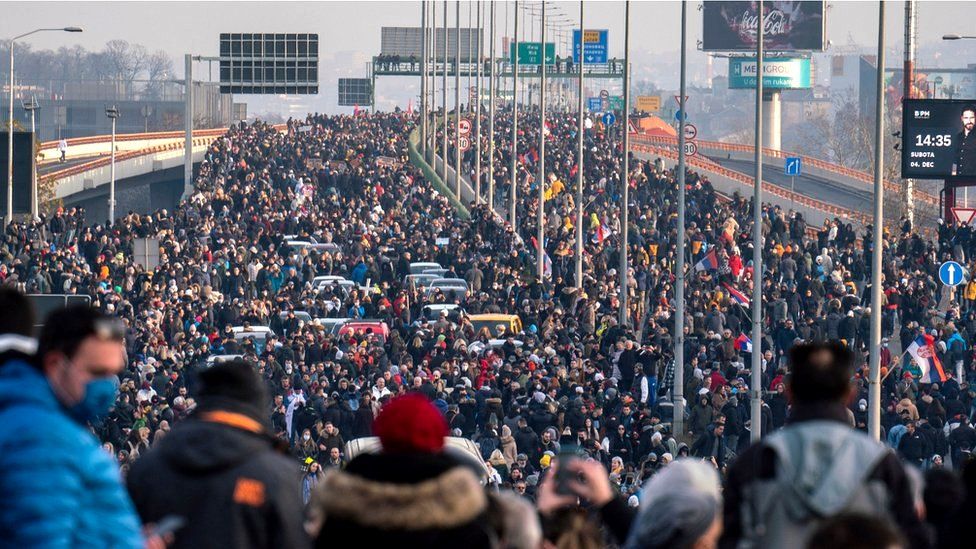KIP: ‘Życie z covid’ czyli uwaga na pułapkę

1. Jerzy Zięba – Uczymy sie jak przygotować wlew
2. Ziggy Texas: Porannik Nowego Świata – 20 01 2022 – STOP! Najważniejszy Porannik tego roku
https://youtu.be/6o68sfGbhYY
3. BBC news! – Serbia anulowała umowę o wydobyciu litu z Konsorcjum Australijskim na 3,5 mld USD – Kolejny as serwisowy Nowaka Djokovicza
Serbia revokes Rio Tinto lithium mine permits following protests
 Image source, Getty Images
Image source, Getty ImagesSerbia has withdrawn the exploration licences of Anglo-Australian mining company Rio Tinto following weeks of protests over plans for a lithium mine.
„All permits were annulled… we put an end to Rio Tinto in Serbia,” Prime Minister Ana Brnabic said on Thursday.
The decision comes just weeks ahead of Serbia’s general election in April.
Relations between Belgrade and Canberra have also soured recently over Australia’s treatment and deportation of Serbian tennis star Novak Djokovic.
Djokovic, the world’s number one men’s tennis player who was unable to compete in the Australian Open, has supported the protests against the controversial mine.
In December, he posted images on social media of demonstrators and green landscapes along with comments written in Serbian such as „clean air and water are the keys to health” and „nature is our mother”.
Thousands of demonstrators have been taking to the streets in recent months, blocking main roads in several cities, including the capital Belgrade and the country’s second-largest city Novi Sad.
They say the development of a large mine near the town of Loznica in the western Jadar Valley could cause irreparable damage to the landscape and contaminate the region’s water supplies.
Rio Tinto had previously said that any mining development in the country would meet both domestic and European Union environmental standards.
Speaking at a news conference in Belgrade on Thursday, Ms Brnabic – Serbia’s first woman and first openly gay prime minister – said the decision to abandon the $2.4bn (£1.8bn; A$3.3bn) Jadar lithium mine was made in response to requests from environmental groups.
The project had been due to start production in 2027.
Rio Tinto’s shares tumbled in Australia following the news, and were down more than 4% after markets opened in London.


It is undoubtedly tempting to look for a link between Australia’s treatment of Novak Djokovic and Serbia’s cancellation of Rio Tinto’s mining project.
After all, it does have headquarters in Melbourne as well as London. And Serbia’s prime minister, Ana Brnabic, announced the demise of the much-trumpeted lithium extraction operation just days after her counterpart in Australia cheered the deportation of Serbia’s sporting icon.
The cancelled project is more likely a victim of Serbia’s domestic politics, rather than a bizarre diplomatic tit-for-tat. Novak Djokovic is important to Serbia – but not as important as the $2.4bn which the mining giant had promised to invest.
In fact, pulling the plug is a reaction to months of protests. The movement has surprised Serbia’s authorities with its organisation, unity and broad support going well beyond the usual coalition of opposition activists.
The government does not want to go into April’s elections against a backdrop of blocked roads and accusations about favouring foreign investors over local interests.
But the environmentalists say they will continue protesting until the authorities issue a permanent ban on lithium mining.

In December, local authorities in western Serbia scrapped a plan to allocate land for a lithium mine in the region.
President Aleksandar Vucic had said that the opening of such a mine would require approval following an environmental study and a referendum.
In a statement to Reuters news agency, the Australian government said it regretted Serbia’s decision: „We note the strong economic benefits of the significant investment by Rio Tinto in Serbia,” it said.
Lithium is the main component of the batteries used in electric vehicles and demand for the element is increasing.
The World Bank estimates that globally the production of lithium will need to increase by 500% by 2050.
Serbia: projekt kopalni litu zawieszony przez rząd
Premier Serbii Ana Brnabić poinformowała o zawieszeniu wszystkich działań i projektów związanych z eksploatacją krajowych złóż litu . W zeszłym roku tysiące Serbów wyszło na ulicestolicy i wielkich miast, żeby zaprotestować przeciwko projektowi otwarciu kopalni litu w dolinie Jadar, gdyż kopalnia taka grozi zatruciem rzek i gleby rolnej w zachodniej części Serbii.
Głównym inwestorem jest korporacja Rio Tinto z siedzibą w Londynie, która bada możliwości eksploatacji złóż litu w Serbii, uważanych za największych w Europie. Lit jest ważnym składnikiem baterii samochodów elektrycznych, a ich produkcja wzrośnie w kolejnych latach. Premier Serbii zapewniła, że Rio Tinto nie dostanie zezwolenie na eksploatację, a dotychczasowe licencje stracą niedługo swoją ważność. Ana Brnabić podkreśliła, że rząd nie podpisywał żadnej umowy z korporacją. Jeżeli jednak korporacja będzie domagać się odszkodowań, serbski rząd uda się do sądu .
Źródło: euractiv.com
https://studium.uw.edu.pl/serbia-projekt-kopalni-litu-zawieszony-przez-rzad/
Serbian government blasts green groups for scuttling Rio’s lithium project
BELGRADE, Jan 21 (Reuters) – Serbian politicians on Friday blasted environmentalists for forcing them to scuttle Rio Tinto Plc’s (RIO.AX), (RIO.L) proposed $2.4 billion lithium project, warning the move could hurt efforts to grow and diversify the Balkan country’s economy.
Environmentalists, though, having scored a victory after the government bowed to pressure and revoked Rio’s lithium exploration licences on Thursday, are now demanding a moratorium on lithium mining before expected elections in April to ensure the decision is not reversed afterwards.
Zorana Mihajlovic, Serbia’s mining and energy minister, said late on Friday that Belgrade acted to fulfil the requests by various green groups to halt the Jadar lithium project, but accused them of injecting politics into environmental issues.
„The government showed it wanted the dialogue … (and) attempts to use ecology for political purposes demonstrate they (green groups) care nothing about the lives of the people, nor the industrial development,” Mihajlovic told reporters.
The country’s populist ruling coalition, led by the Serbian Progressive Party (SNS), has come under fire for backing lithium and copper mining, eroding the comfortable majority won in a 2020 vote.
The decision is a major setback for Rio, which was hoping the project would help make it one of the world’s 10 biggest producers of lithium. China is the world’s largest consumer and processor of the metal, and various European countries have been working to boost their own output.
Rio last month said it would buy a second lithium asset for $825 million in Argentina, as it looks to build its battery materials business.
The European Battery Alliance, a network of electric vehicle supply chain companies formed by Brussels, said the Jadar project „constituted an important share of potential European domestic supply.” Serbia is not a member of the EU, though it hopes to join the bloc in coming years.
„It would have contributed to support the growth of a nascent industrial battery-related ecosystem in Serbia, contributing to a substantial amount to Serbia’s annual GDP,” the alliance said in a statement.
Rio’s shares in Australia closed down 4.2% on Friday. While in London, Rio’s shares ended down 2.2%.
Thousands of Serbians blocked roadsin protests against the government’s backing of the project in recent months, demanding Rio leave the country and forcing the local municipality to scrap a plan to allocate land for the facility.
More protests are scheduled for Saturday in the town of Loznica in western Serbia where the mine was to be built, said Ljiljana Bralovic, one of the protest leaders.
„We want not only to see Rio Tinto out (of Serbia), we also want a permanent ban on the exploitation of lithium and borates,” Bralovic said.
Aleksandar Jovanovic Cuta, another protest leader, said green groups would prevent any future government’s attempt to negotiate a new deal with Rio Tinto after the elections.
A sign adorns the building where mining company Rio Tinto has their office in Perth, Western Australia, November 19, 2015. REUTERS/David Gray
„Anyone who tries to do that is crazy, all of Serbia would pour to the streets,” he said.
SUPPLY SHORTAGE
On Thursday, Rio said it was „extremely concerned” by Serbia’s decision and was reviewing the legal basis for it.
The Australian government said it regretted Serbia’s decision.
Relations between Belgrade and Canberra have soured after Sunday’s deportation of Serbian tennis star Novak Djokovic from Australia over its COVID-19 entry rules.
Djokovic spoke out in support of „clean air” in a December Instagram story post captioning a picture of the anti-mining protests, which was published by The Bridge, a digital sports platform.
Rio has already spent $450 million in pre-feasibility, feasibility and other studies on Jadar to understand the nature of the deposit, the company said in a project fact sheet in July.
„The level of opposition to it has really ratcheted up over the last six months,” Credit Suisse analyst Saul Kavonic said of the Jadar mine.
„We’ve been highlighting for a while now there would be about $2 a share at risk if the government cancels it.”
At full capacity, the Jadar mine was expected to produce 58,000 tonnes of refined battery-grade lithium carbonate a year, making it Europe’s biggest lithium mine by output.
Experts said the world’s shortage of lithium had been forecast to last for another three years at least, but with the cancellation of the Jadar project, the shortfall would be exacerbated. read more
„We’re at the point now where lithium supply is going to set the pace of electric vehicle rollout,” Kavonic said.
Robust global demand for the metal far outstripping supply growth has boosted lithium prices in recent years.
Lithium futures , which started trading on the CME in May last year, have jumped 171% to a record high of $38/kg on Thursday, according to Refinitiv data.
4. Bibuła: ‘Życie z covid’ czyli uwaga na pułapkę
źródło: https://www.bibula.com/?p=130688
